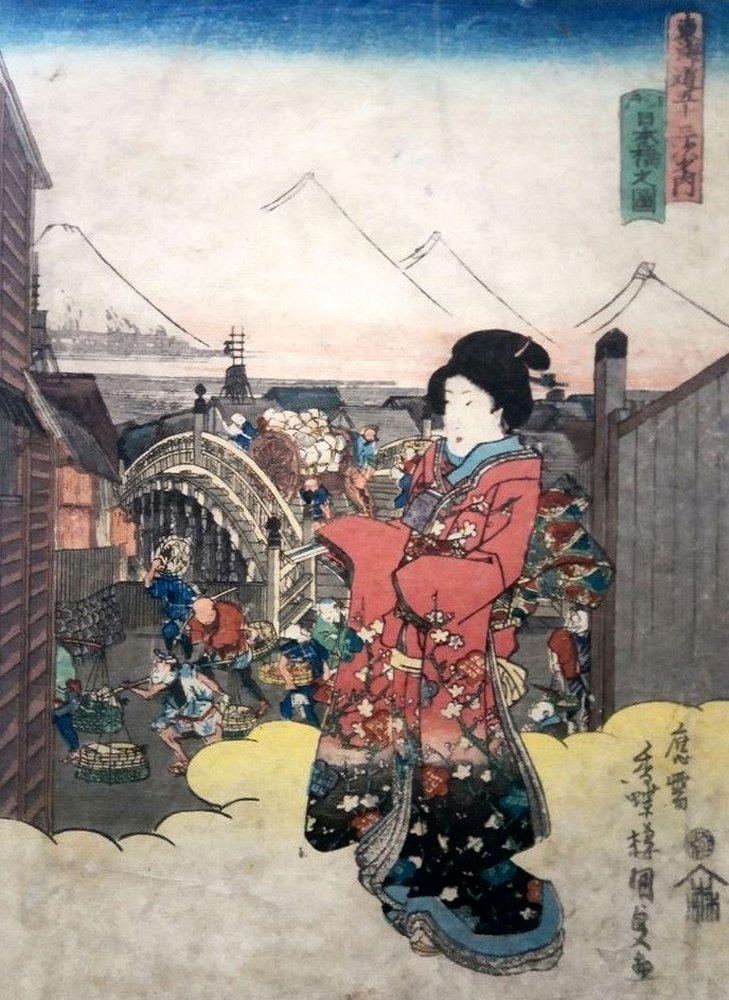| |
KUNISADA(Toyokuni-III)(1786 - 1864)"View of Nihonbashi in Edo" |

"View of Nihonbashi in Edo"
("Edo Nihonbashi no zu", "江戸日本橋之図")
Series: "Fifty-three Stations of the Tôkaidô Road" ("Tôkaidô gojûsan tsugi no uchi", "東海道五十三次之内")
1838
Publisher - Moriya Jihei (森屋治兵衛) with his company's Kinshindō-seal; circular censor's seal (改印) "kiwame" ("極") above the publishers mark on lower right
Image Size - 25.4 X 18.3 cm (10" x 7 15/64")
("Edo Nihonbashi no zu", "江戸日本橋之図")
Series: "Fifty-three Stations of the Tôkaidô Road" ("Tôkaidô gojûsan tsugi no uchi", "東海道五十三次之内")
1838
Comment -A famous view with a bijin
holding a folded fan in her right hand, showing the Edo side
of the Nihonbashi Bridge (日本橋)
towards Mount Fuji in the far distance. The city is developing
to the horizon on the other side of the Edo River. A fire
watchtower is to be seen amidds the rooftops. A blue bokashi
sky and mist in the distance suggest e scene around sundown.
The Bijin wears a kimono
decorated with blossoming cherry
branches. She seems to float on a
white cloud like a classical fairy. Four Edo Kaku
Kites (江戸角) are floating in the distance, the kite lines
mimicking the slope of Mount Fuji. Busy business on and around
the bridge, Nihonbashi is still a core business district of
todays "Edo".
The Nihonbashi bridge first became famous during the 17th century, when it was the eastern terminus of the the Tōkaidō as Station No 1 in the series, with background based on Hiroshige's design for the First Tokaido. The road ran between Edo and Kyoto. During this time, it was known as Edo bashi, or "Edo Bridge." In the Meiji era, the wooden bridge was replaced by a larger stone bridge, which still stands today, but is overbuild by an ugly expressway, obscuring the classic view of Mount Fuji from the bridge. If you are standing on Nihonbashi Bridge and are looking into the supposed direction of Mount Fuji, you will see a glimpse of the Tokiyo Kite Museum directly under the right modern street bridge. The Museum is is only two hundred fifty steps from here to the right, just behind the Nihonbashi River. The Museum had changed address in 2021. Be sure to have the correct address of the venue.
Nihonbashi is the point from which all distances are measured to the capital. All highway signs indicating the distance to Tokyo actually state the number of kilometres to Nihonbashi.
The Nihonbashi bridge first became famous during the 17th century, when it was the eastern terminus of the the Tōkaidō as Station No 1 in the series, with background based on Hiroshige's design for the First Tokaido. The road ran between Edo and Kyoto. During this time, it was known as Edo bashi, or "Edo Bridge." In the Meiji era, the wooden bridge was replaced by a larger stone bridge, which still stands today, but is overbuild by an ugly expressway, obscuring the classic view of Mount Fuji from the bridge. If you are standing on Nihonbashi Bridge and are looking into the supposed direction of Mount Fuji, you will see a glimpse of the Tokiyo Kite Museum directly under the right modern street bridge. The Museum is is only two hundred fifty steps from here to the right, just behind the Nihonbashi River. The Museum had changed address in 2021. Be sure to have the correct address of the venue.
Nihonbashi is the point from which all distances are measured to the capital. All highway signs indicating the distance to Tokyo actually state the number of kilometres to Nihonbashi.
Series - "Fifty-three Stations of
the Tôkaidô Road" ("Tôkaidô gojûsan tsugi no uchi",
"東海道五十三次之内") The series title is in the reddish cassete upper
right, next to the green title cassette.
Artist - see Biography
Signature - Ôju Kôchôrô Kunisada ga (応需香蝶楼国貞画) lower right
Artist - see Biography
Signature - Ôju Kôchôrô Kunisada ga (応需香蝶楼国貞画) lower right
Publisher - Moriya Jihei (森屋治兵衛) with his company's Kinshindō-seal; circular censor's seal (改印) "kiwame" ("極") above the publishers mark on lower right
Image Size - 25.4 X 18.3 cm (10" x 7 15/64")
Copyright 2008 ff: Hans P. Boehme